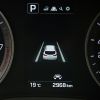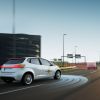The Department for Transport (DfT) suggested that Automatic Lane Keeping Systems (ALKS) could steer vehicles in stop-start traffic of up to 37 mph.
Use of ALKS – which has been approved by United Nations regulations that came into force in Britain on Friday – is confined to roads where traffic moving in opposite directions is physically separated and no pedestrians or cyclists are allowed.
The decision follows a call for evidence in August on how automated technology could make driving “safer, smoother and easier for motorists”.
New Teslas and a Mercedes S-class due to arrive this year are expected to be among the first eligible vehicles capable of safely driving themselves, as goverment legislation put it, “in at least some circumstances or situations”*.
Motorists could soon be using their phones, watching films on tablets, or even reading books behind the wheel, in accordance with The Automated and Electric Vehicles Act 2018.
Car safety expert Thatcham Research has voiced its concerns about ALKS technology, which it points out is unable to make a vehicle change lanes to avoid trouble, instead simply slowing them to a halt.
Although entertainment systems turn off in the event of an accident, distracted drivers may also struggle to react in time to hazards on the road.
While Mr Shapps has made it clear that he wants Britain to be the first country to benefit from ALKS, some insurance professionals are calling for tighter regulations.
Rather than objecting to drivers using the technology they believe a human should be in charge at all times until the arrival of fully autonomous vehicles.
- Driverless cars: a guide to current and future tech
- Autonomous emergency braking: what you need to know
- Self-driving tech requires more training
Lilian Greenwood, a Labour member of the transport select committee, argues that ALKS isn’t up to the task: “It simply isn’t safe for drivers to ignore the road and do other things while the technology is unable to respond safely to the unexpected.”
The DfT said: “We have sought views on the use of the automated lane-keeping system to pave the way towards introducing it safely on UK roads. No decision has yet been made on whether to allow ALKS to operate up to 70mph.”
The “dangerous misconception” of a truly self-driving car spurred Thatcham research to devise a first-of-its-kind Assisted Driver Grading system.
Partnering with Euro NCAP, the safety specialist hopes to better equip motorists to understand assisted driving features on modern cars.
How do you feel about autonomous driving tech? Leave us a comment below.

RAC sale – up to 33% off*
• Roadside cover from £5.29 a month†
• We get to most breakdowns in 60 mins or less
• Our patrols fix 4/5 breakdowns on the spot











